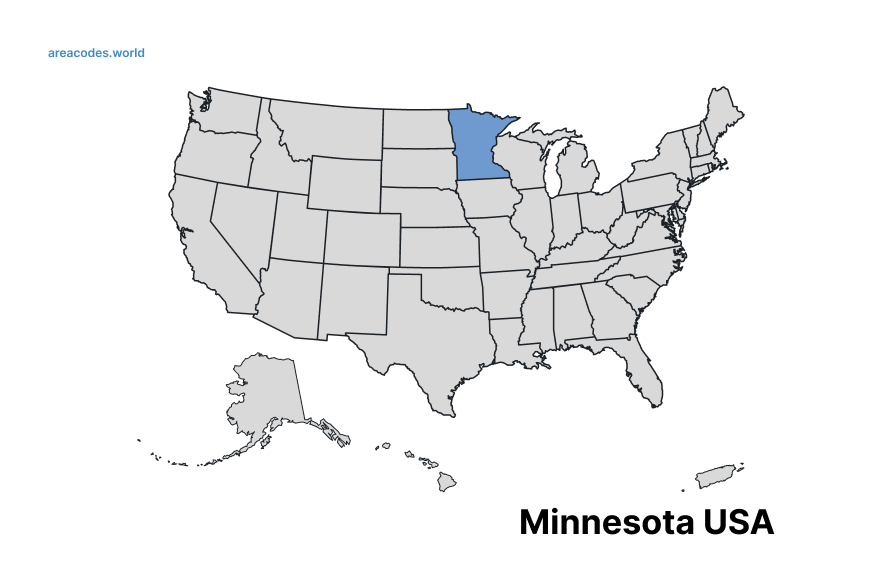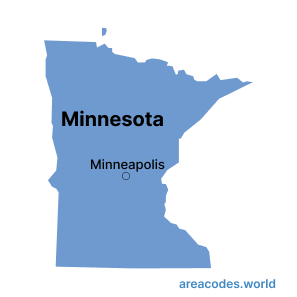Minnesota Area Code
Area codes in Minnesota are numerical prefixes used in the North American Numbering Plan (NANP) to designate specific geographic regions within the state. These codes play a crucial role in routing telephone calls to their intended destinations, helping organize the state's telecommunications infrastructure.
| State | Minnesota |
| State Abbreviation: | MO |
| State Nickname: | North Star State Equality State |
| Capital City | St. Paul |
| Area Codes | 218, 320, 507, 612, 651, 763, 952 |
| Timezone | Central Time Zone (CT) |


What time zone is Minnesota?
Minnesota is generally in the Central Time Zone (CT) of the United States. The entire state follows Central Standard Time (CST), which is UTC-6, during the standard time of the year. However, during daylight saving time, Minnesota observes Central Daylight Time (CDT), which is UTC-5. Daylight saving time in Minnesota typically begins on the second Sunday in March and ends on the first Sunday in November when clocks are set forward by one hour to observe CDT.
Note that the start and end dates of daylight saving time can change
History
Area codes in Minnesota have evolved to meet the state's growing telecommunications demands. The original Area Code 612, established in 1947, covered the entire state but later split to create Area Code 651 for the eastern Twin Cities area in 1998. Additional area codes like 763, 952, 218, and others have been introduced over the years to accommodate increased phone usage and population growth, ensuring efficient communication within the state.
All Area Codes in Minnesota
This table provides a quick overview of all area codes, their locations, and some historical context for each.
| Area Code | Location | History and Details |
|---|---|---|
| 218 | Northern Minnesota | Covers northern regions, including Duluth and Bemidji. |
| 320 | Central Minnesota | Serves central areas, including St. Cloud and Alexandria. |
| 507 | Southern Minnesota | Covers southern regions, including Rochester and Mankato. |
| 612 | Minneapolis | Originally covered the entire state, now serves Minneapolis and some suburbs. |
| 651 | Eastern Twin Cities | Covers the eastern part of the Twin Cities metropolitan area, including St. Paul. |
| 763 | Northwest Suburbs | Serves suburbs in the northwest of the Twin Cities metropolitan area. |
| 952 | Southwest Suburbs | Covers the southwestern suburbs of the Twin Cities metropolitan area. |
Largest Cities in Minnesota with area codes
Quick overview of large cities, their area codes, and some historical context for each in Minnesota.
| Name | Area Code | History and Details |
|---|---|---|
| Minneapolis | 612, 763, 952 | The largest city in Minnesota, part of the Twin Cities metropolitan area, known for its cultural diversity, arts, and vibrant economy. |
| St. Paul | 651 | The capital city of Minnesota, situated adjacent to Minneapolis, known for its historic sites and government institutions. |
| Rochester | 507 | Located in southeastern Minnesota, known for the Mayo Clinic and healthcare industry. |
| Duluth | 218 | A major port city in northern Minnesota, situated on Lake Superior, known for its natural beauty and shipping industry. |
| Bloomington | 952 | Suburb of Minneapolis, known for its shopping centers and proximity to the Mall of America. |
| Plymouth | 763 | Suburb of Minneapolis, recognized for its parks and recreational activities. |
| Brooklyn Park | 763 | Suburb of Minneapolis, known for its diverse community and educational institutions. |
| Woodbury | 651 | Suburb of St. Paul, offering a mix of residential and commercial amenities. |